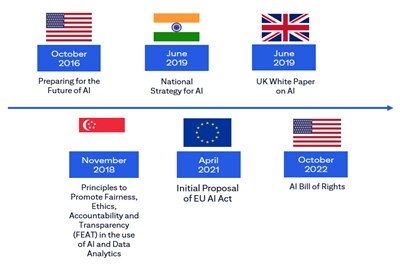
With AI grabbing headlines and developing at rapid pace, many are asking who’s in charge?
A recent Citi report, AI Time- What You Need to Know about AI Regulation, aims to foster better understanding of the current environment for AI regulation across the globe, with a specific focus on the United States, United Kingdom, European Union, Singapore, and India.
Progress of AI regulation globally

© 2023 Citigroup Inc. No redistribution without Citigroup’s written permission.
Source: Citi Global Insights
It’s clear that countries are in various stages of evolving their approach to regulating AI and take differing views of how best to do it. According to Danny Tobey, who chairs law firm DLA Piper’s artificial intelligence unit, “there are over 700 active policy initiatives globally trying to regulate AI”.
Additionally, Stanford University’s most recent Artificial Intelligence Index Report found that the number of bills dedicated to AI increased from 1 in 2016 to 37 in 2022 across 127 countries.
The report points out that currently most governments opt for a more flexible approach to AI regulation, where there is a focus on principles rather than rules. This is most notable in the United States (AI Bill of Rights), United Kingdom (White Paper) and Singapore (Principles to Promote Fairness, Ethics, Accountability and Transparency (FEAT) in the Use of AI and Data Analytics)
In the U.S, perhaps the most prominent issuance of regulation at the federal level is the Blueprint for an AI Bill of Rights, proposed by the Biden administration in October 2022. Published by the White House Office of Science and Technology Policy (the “OSTP”), the Bill of Rights is a non-binding document offering guidance on ways to mitigate risks posed by AI through the implementation of five key principles described in full in the report.
By contrast, the EU stands out through its rules-based approach in its proposed AI Act, introduced in 2021 with the intention of being agreed upon in the EU Parliament and implemented later this year. Any corporation or entity subject to the obligations under the Act and operating within the EU can be sanctioned with fines if violations occur.
Existing legislation around the world may be applied to tackle some of the adverse impacts of AI. For example, AI is unlikely to be excluded from privacy, data protection, competition and equality laws already in place.
Given divergent government approaches, multinational corporations may look to adopt standards aligned with the strictest regulations to ensure there is consistency across global operations.
AI has the ability to change society profoundly, with stakeholders trying to strike the right balance between fostering innovation and growth opportunities while managing disruption and risk challenges
For more information on this subject, if you are a Velocity subscriber, please see AI Time: What you need to know about AI regulation (18 May)
Citi Global Insights (CGI) is Citi’s premier non-independent thought leadership curation. It is not investment research; however, it may contain thematic content previously expressed in an Independent Research report. For the full CGI disclosure, click here.